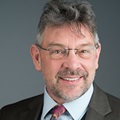Stealthy Ganymed gets €45m for 'ideal' Mabs in tricky solid tumors
This article was originally published in Scrip
The €45m that 80-person stealth company Ganymed Pharmaceuticals raised on 18 November from existing investors should take its lead compound through to the brink of Phase III completion in gastroesophageal cancer, but the company may still be looking to raise more money in order to leverage its compounds into US and Asia market. Ganymed, which had raised over €100m prior to this move, has been developing what it calls 'ideal' antibody products, those where the target is distributed widely on tumors but absent, or virtually absent from normal tissue.
Luc St Onge, Chief Business Development Officer with Mainz, Germany-based Ganymed, told Scrip that the new money gives the company a number of options including completing the Phase III study on its lead compound IMAB362, which is in advanced phase II testing for gastroesophageal cancer. Mr St Onge told Scrip that IMAB362 meets the 'ideal' antibody profile because it binds to the tight junction protein Claudin-18.2, an antigen expressed in up to 80% of gastroesophageal adenocarcinomas, and 60% of pancreatic tumors but is absent from 45 normal tissues tested.
The company's 'ideal' antibody approach appears to be relatively expensive, however. Although Mr St Onge said that Ganymed's "back was not up against the wall" when it raised this latest round, he could not say how much money the company had in the bank before the fundraising. He did explain, however, that the company had been able to "fly under the radar" of press and investor attention during the last few years thanks to large early financings, including a €37.7m C round in 2007 and a €65m D round in completed in 2008. Having spent a good proportion of that money, the company has just the one clinical stage product, IMAB362, and a preclinical follow-up, IMAB027, a monoclonal that targets GT512, an antigen expressed in a wide range of solid cancers, including testicular, ovarian, uterine, and lung cancer.
Its investors seem happy enough with progress, though. In addition to leading this most recent refinancing, Thomas Strüngmann of lead investor ATS Beteiligungsverwaltung said investors were “very pleased that in the space of just three years, the Ganymed team has made immense progress in the clinical development of its lead program." He added that IMAB362 "may well represent a breakthrough in the treatment of solid cancers.”
The financing will allow Ganymed to conduct a Phase I/II clinical study of IMAB027 in ovarian cancer and also to develop a companion diagnostic test for this antibody.
Ganymed has already a developed a CE-marked companion diagnostic for lead product IMAB362, a test it is using to select all the patient for its current Phase IIb and its future Phase III studies. The preemptive use of the diagnostic test, which is direct contrast to the way in which bigger pharmaceutical companies generally approach oncology trials "show faith in our mechanism of action, and will save money in recruiting patients that we don't expect to respond," explained Mr St Onge.
The safety data on IMAB362 was "very encouraging", he said, with no adverse events seen in the 15-patient Phase I trial in 2010 and just transient nausea in some of the Phase II patients.
The Phase III trial of IMAB is expected to be fully enrolled by the second half of 2014.
Ganymed has used the close clinical networks of its senior management and board members to facilitate access to clinical trial subjects in Germany and other parts of Europe but, Mr St Onge said, it recognized that it might have to find other ways of building a clinical presence in Asia and the United States. "We are discussing internally the ways in which we can build the necessary structure," he said, and this latest financing gives us more options in that regard, too."
